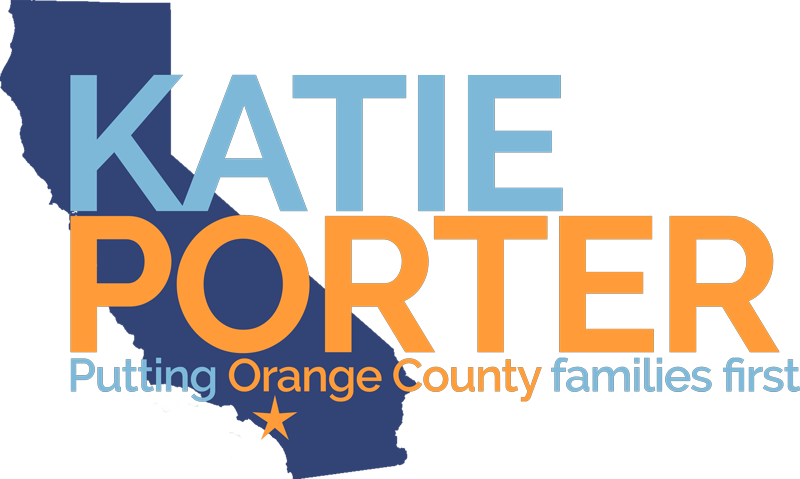Press Releases
Rep. Porter Introduces Legislation to Enforce Equal Coverage Requirements for Mental Health Services as Other Types of Medical CareCongresswoman’s bipartisan Mental Health Parity Compliance Act would improve enforcement of requirement that mental health coverage not be more restrictive than other types of medical care
Washington, DC,
June 10, 2019
Tags:
Health Care
Congresswoman Katie Porter (CA-45) introduced bipartisan legislation to improve health plans’ and insurers’ compliance with mental health parity laws, which require that mental health coverage cannot be more restrictive than coverage for other medical care. She was joined by Democratic Rep. Donald Norcross (NJ-1) and Republican Rep. Gus Bilirakis (FL-12) in introducing this bill. “As long as mental health services are not treated as equal to other types of medical care, people struggling with mental illness in the 45th District and across the country will face unnecessary barriers to accessing potentially life-saving care,” Congresswoman Porter said. “I’m proud to work with my colleagues on both sides of the aisle to ensure compliance with current law requiring equal treatment of mental and medical care—it is past time to end this disparity once and for all.” The Mental Health Parity and Addiction Equity Act was signed into law in 2008, but more than a decade later, health plans and insurers are still violating the law with plans that do not provide equal coverage for mental and medical care. Congresswoman Porter’s Mental Health Parity Compliance Act would require health plans and insurers to conduct in-depth analyses to ensure that plans are compliant and would direct the Secretaries of both the Department of Health and Human Services and Labor to request these analyses if there are patient complaints that the plans are not compliant. Under the bill, 50 plans and insurers will be selected at random for an annual compliance investigation, and the report from this investigation will be submitted to Congress. “Every single year we’re losing more Americans to the opioid epidemic than we did in all of the Vietnam War and, unfortunately, suicide is also on the rise in nearly every state in our nation,” said Congressman Norcross, Vice-Chair of the Bipartisan Addiction Task Force. “While mental health parity is rightfully the law of the land, our enforcement mechanisms are severely lacking and companies aren’t fully complying with the law. Along with my Parity Enforcement Act, the Mental Health Parity Compliance Act will help our friends and neighbors struggling with mental health and substance-abuse disorders by making sure the promise of parity is a reality. Our healthcare system should be working for all Americans – no matter if their condition is physical or mental.” “As part of removing the stigma for treating mental illness, we must ensure that mental health needs are recognized as legitimate healthcare issues. One way to do that is to ensure parity between coverage for healthcare and mental healthcare services—which happens to be the law. For far too long, I have heard patient accounts of some bad insurance actors who are blatantly ignoring the Mental Health Parity law and provide inadequate mental health coverage. I am proud to work with my colleague on this bipartisan effort to collect data regarding this important issue. This is the first step in providing accountability for compliance with this law,” said Congressman Bilirakis. The Mental Health Parity Compliance Act is based on a best-practice approach that has been enacted in state legislatures in Delaware, District of Columbia, Illinois, New Jersey, and Tennessee. It protects patients and ensures that those required to provide health insurance are following a law intended to support access to critical mental health services. Senators Chris Murphy (D-CT) and Bill Cassidy (R-LA) introduced the bill in the Senate, and the legislation received support from the American Psychiatric Association, the American Psychological Association, Mental Health America, the American Occupational Therapy Association, and the Mental Health Liaison Group, which includes more than 50 member organizations representing consumers, families, providers advocating to strengthen access to high-quality mental and behavioral health care. “For too long insurers have neglected their responsibility to adequately provide coverage for patients with mental illness or substance use disorders,” said American Psychiatric Association President Bruce Schwartz, M.D. “This bill will help to ensure those patients be treated like patients with any other illness and end this harmful discrimination.” Katherine B. McGuire, chief advocacy officer of the American Psychological Association, said, “Americans are not getting sufficient access to mental health and substance use disorder treatments, which is more urgent than ever in light of the nation’s opioid and suicide crises. The Mental Health Parity Compliance Act would let regulators see inside health insurance plans to determine if they are complying with the federal parity law by giving patients with mental health and substance use disorders access to coverage equal to that which medical patients receive.” “The American Occupational Therapy Association is grateful to Rep. Porter for introducing the Mental Health Parity Compliance Act. Today, more than 10 years after federal parity was enacted, access to mental and behavioral health services continues to be more restricted and challenging than accessing other covered services. Overly strict prior authorization, network limitations or other utilization management techniques are difficult to track and frustrate consumers. The Mental Health Parity Compliance Act will provide the transparency and accountability needed to remove these often secret and hard to measure barriers to care, and help reach the goal of equal access to mental and behavioral health services,” said Heather Parsons, American Occupational Therapy Association Associate Chief Officer for Federal Affairs. ### |
